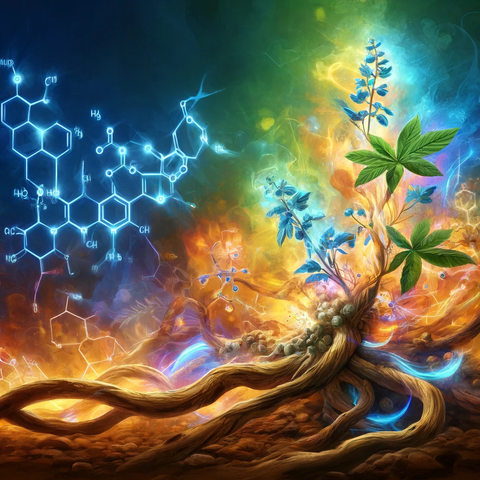
What Does Kava Do To The Body?
Share
Ever feel the weight of the world on your shoulders? Stress creeping in and disrupting your sleep? If you're seeking a natural approach to unwind and promote relaxation, kava might be worth exploring. This unique herb, with a rich history rooted in Pacific Island cultures, has been gaining traction as a potential natural remedy for a variety of concerns.
But what exactly does kava do to your body? This comprehensive guide delves into the science behind kava, exploring its effects on your central nervous system, potential benefits for anxiety and sleep, and even investigating its impact on mood and muscle tension.
Kava (Piper methysticum) is a shrub native to the South Pacific islands, where it's been consumed for centuries in ceremonial settings. Traditionally prepared as a beverage by grinding the plant's roots into a fine powder and straining it with water, kava is known for its calming and relaxing properties. Today, kava is available in various forms like capsules, extracts, and even powdered root for those looking for a convenient way to experience its potential benefits.
As interest in kava grows, so does the desire to understand its impact on the body. This guide will equip you with the knowledge you need to make informed decisions about incorporating kava into your wellness routine. We'll explore the science behind kava's effects, weigh the potential benefits against any drawbacks, and ultimately empower you to navigate this natural remedy with confidence.
So, buckle up and get ready to unlock the secrets of kava! This in-depth exploration will shed light on how kava interacts with your body's systems, potentially promoting relaxation, reducing anxiety, and even improving sleep quality. By the end, you'll have a clear understanding of kava's potential and the important factors to consider before incorporating it into your wellness regimen.

Kava's Chemical Powerhouse: Unveiling the Kavalactones
Kava's effects on the body stem from a unique group of compounds called kavalactones. These fascinating molecules reside within the plant's rhizomes, the underground stems that store nutrients. Think of them as tiny messengers waiting to be released and interact with your body's systems.
The number of kavalactones identified in kava can vary from six to eighteen, depending on the specific plant variety, growing conditions, and even the preparation method used. This natural variation in kavalactone content is what can influence your experience with kava.
Here's a breakdown of how kavalactone variations can affect you:
- Potency: The concentration of different kavalactones plays a big role. Some kavalactones, like kavain and dihydrokavain, are known for their relaxing and calming effects. Higher concentrations of these potent kavalactones can lead to a more pronounced calming experience.
- Experience Spectrum: Different kavalactones can influence the user's experience in diverse ways. While some kavalactones promote relaxation, others might contribute to a mildly euphoric feeling. This spectrum of effects allows kava to potentially address various concerns, from anxiety to occasional sleeplessness.
Understanding these variations is crucial. When choosing a kava product, it's important to consider the kavalactone content and the desired outcome. Opting for a product with a standardized kavalactone profile ensures consistency and helps you predict the potential effects.
By delving deeper into kava's chemistry, you gain a greater understanding of how this natural remedy interacts with your body. In the next section, we'll explore how kavalactones might influence your central nervous system, potentially promoting relaxation and offering relief from anxiety.

Kava and Your Central Nervous System: Unveiling the Calming Connection
Kava's journey within your body begins with its interaction with your central nervous system (CNS), the intricate network that governs everything from your thoughts to movements. Here, kava's unique chemistry unfolds, potentially promoting relaxation and offering relief from anxiety.
Unwinding the Mind: Kava's Calming Touch
Kava acts as a mild depressant within the CNS. This doesn't mean it completely shuts down your brain function, but rather gently slows down activity in certain areas. Imagine it as turning down the volume on your internal chatter, creating a sense of calm and easing nervous tension.
The resulting effects are often described as a feeling of relaxation, a reduction in stress, and a quieting of the mind. This calming influence can be a welcome respite for those experiencing occasional anxiety or difficulty unwinding before bed.
However, it's important to be aware of potential side effects associated with kava's CNS depressant nature. These can include:
- Drowsiness: Kava's calming effects can sometimes lead to drowsiness, especially at higher doses. It's best to avoid kava before activities requiring alertness, like driving or operating machinery.
- Impaired Coordination: Similar to alcohol, kava can slightly impair coordination and reaction time. Exercise caution when engaging in activities that require precise movements.
- Slurred Speech: In some cases, kava may cause slurred speech, particularly at higher doses.
It's crucial to remember that kava's effects are not identical to alcohol. While both act as CNS depressants, kava doesn't produce the intoxicating or inebriating effects associated with alcohol.
Taming the Anxious Chatter: Kava's Potential for Anxiety Relief
Beyond its calming effects, kava also holds promise for those seeking natural ways to manage anxiety. Studies suggest that kava may influence the activity of certain brain chemicals, like GABA (gamma-aminobutyric acid), which plays a role in regulating mood and anxiety. By potentially increasing GABA activity, kava might help to quiet the anxious chatter in the mind and promote a sense of calmness.
Several studies have compared kava's effectiveness to conventional anti-anxiety medications. While some research shows promising results, others haven't found a definitive benefit. The current research landscape suggests that more studies are needed to fully understand kava's potential for anxiety.
The takeaway? Kava's interaction with the CNS offers a fascinating glimpse into its potential for relaxation and anxiety relief. However, it's important to manage expectations and acknowledge the ongoing research. In the next section, we'll delve deeper into kava's potential benefits for sleep and explore other ways it might influence your well-being.

Beyond Relaxation: Exploring Kava's Spectrum of Potential Benefits
While kava's calming touch on the CNS takes center stage, its potential effects extend beyond relaxation and anxiety relief. Let's explore some additional areas where kava might offer support:
- Pain Relief: Some users report experiencing mild pain relief after consuming kava. The exact mechanism behind this is yet to be fully understood, but kava's influence on the nervous system might play a role. More research is needed to confirm kava's effectiveness for pain management.
- Muscle Relaxation: The calming effects of kava might translate to a soothing sensation in muscles, potentially easing tension and promoting a feeling of looseness. While anecdotal evidence exists, clinical studies are needed to definitively determine kava's role in muscle relaxation.
- Mood Elevation: Some users describe a mild mood-lifting effect after consuming kava. This could be linked to its influence on brain chemistry and the calming of anxious thoughts. However, further research is required to understand kava's impact on mood and its potential benefits for mood disorders.
It's important to remember that these potential benefits are based on preliminary research and anecdotal evidence. Large-scale clinical studies are crucial to solidify kava's role in these areas and determine its effectiveness.
However, this glimpse into kava's diverse effects paints a picture of a natural remedy with a range of potential applications. As research continues to unveil its secrets, kava may prove to be a valuable tool for promoting overall well-being.

Navigating the Landscape: Kava's Potential Risks and Side Effects
While kava offers a range of potential benefits, it's crucial to be aware of its potential drawbacks before incorporating it into your wellness routine. Here, we'll explore the most concerning side effect and some additional ones to keep in mind:
The Shadow Side: Potential Liver Damage
The most significant concern surrounding kava is its potential to cause liver damage, especially with long-term use. While the exact mechanisms by which kava might harm the liver are still being investigated, some theories suggest it could be related to:
- Metabolic Burden: Kavalactones, kava's active ingredients, need to be processed by the liver. In some cases, this processing might put a strain on the liver, potentially leading to damage.
- Indirect Effects: Kava may interact with certain medications or supplements, increasing the overall workload on the liver.
It's important to emphasize that not everyone who uses kava experiences liver damage. However, the risk is a significant concern, especially for individuals with pre-existing liver conditions.
Here's what you can do to minimize the risk:
- Consult a Healthcare Professional: Before embarking on a kava journey, discuss it with your doctor. They can assess your individual health and advise on appropriate usage.
- Prioritize Quality: Opt for high-quality kava products from reputable sources. Look for standardized kavalactone content and avoid products with unknown ingredients or potential contaminants.
- Practice Moderation: Stick to recommended dosages and avoid long-term, excessive use.
- Listen to Your Body: Be mindful of how your body reacts to kava. If you experience any concerning symptoms like unusual fatigue, dark urine, or abdominal pain, discontinue use and consult your doctor immediately.
Beyond the Liver: Other Potential Side Effects
While liver damage is the most concerning side effect, kava can also cause some less serious issues, including:
- Stomach Upset: Nausea, indigestion, and mild stomach upset can occur, especially on an empty stomach.
- Headaches: Headaches are a potential side effect, particularly with higher doses.
- Skin Rashes: Some users report experiencing allergic skin reactions after consuming kava.
Remember, these side effects are usually mild and temporary. However, it's always best to start with a low dose and monitor your body's response.
By understanding both the potential benefits and drawbacks of kava, you can make an informed decision about whether it's right for you. In the next section, we'll explore important considerations for using kava safely and effectively.
Conclusion
Kava's journey through your body unveils a fascinating story of potential relaxation, anxiety relief, and even whispers of pain management and mood elevation. Its calming touch on the nervous system offers a welcome respite from daily stress, while its influence on brain chemistry might hold promise for those seeking natural ways to manage anxiety.
However, navigating the kava landscape requires caution. The potential for liver damage, especially with long-term use, necessitates a responsible approach. Consulting a healthcare professional before incorporating kava into your routine is paramount, particularly for individuals with pre-existing liver conditions.
By understanding both the potential benefits and drawbacks, you can make an informed decision about whether kava aligns with your wellness goals. Remember, communication with your doctor is key to unlocking the potential benefits of kava while prioritizing your safety. So, embark on your kava exploration with knowledge as your guide, and unlock the secrets this natural remedy might hold for you.
